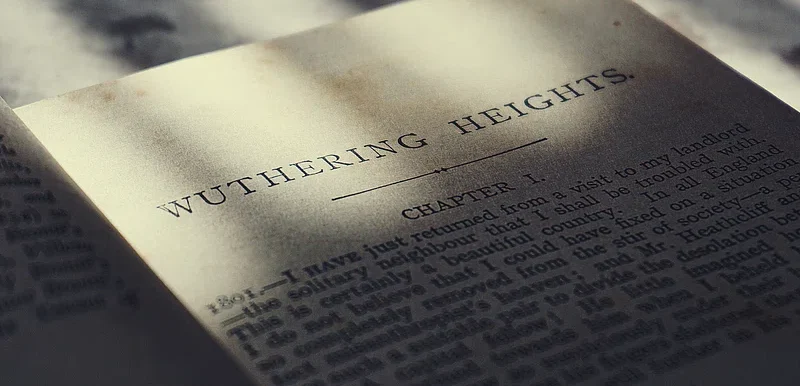If he can’t have love, he wants revenge: A review of Wuthering Heights
It’s safe to say that upon opening my copy of Wuthering Heights, I had high expectations. It is impossible not to have expectations of one of the most famous romance novels of all time.
Even before reading the novel, I knew that the name ‘Heathcliff’ is commonly circulated as a representative of the brooding romantic interest. However, I found him to be a less likeable character than I expected. Throughout the novel, my feelings surrounding Heathcliff oscillated between pity, bafflement, and dislike. His character is as complex and disturbed as Shakespeare’s Hamlet. And there are similarities between the two – they are both haunted by loved ones and both suffer from dysfunctional family situations.
Heathcliff comes to be viewed by the narrator, Ellen Dean, as a black tide that threatens to sweep away the building blocks that Wuthering Heights is built on. He’s always on the fringes of the Earnshaw family, symbolised by his lack of adoption of the name ‘Earnshaw’. He grew up with Catherine, but he is never quite her sibling. Similarly, he loved Catherine but was never quite her husband. Heathcliff’s story is filled with tantalising almosts that serve to torture the readers as well as himself.
…incestuous undertones combined with the isolated characters create a disturbed dreamscape where nothing is ever quite right
The entire novel feels real and yet not; incestuous undertones combined with the isolated characters create a disturbed dreamscape where nothing is ever quite right. Wuthering Heights is an isolated bubble that no other part of the world can touch. Indeed, their world is so separate that Cathy Linton at one stage asks Ellen Dean what lies beyond the hills, having no knowledge of the world beyond, like Rapunzel in her tower. They operate as a society within themselves, but both as a group and individually, they never find a way to operate in a way that makes complete sense. For example, Heathcliff’s normal order of life and death is flipped completely – whilst alive, he continuously suffers as though in hell, and it is only when his mortal life ends that he can reach self-actualisation by haunting the moors immortally with Catherine by his side.
What makes the reader more uneasy is that they are completely reliant on a first-person perspective, which is usually more unreliable than the third person, since they are much closer to the story. I was initially surprised that it was not from the perspective of any of the most central characters, but primarily Ellen Dean, a servant who is a close confidante of many family members. She is always on the fringes of every story she encounters, be it Heathcliff and Catherine or Linton and Cathy; this makes her the most well-equipped character to relate the history of Wuthering Heights to Lockwood, since she has the unique ability to hear and acknowledge multiple perspectives. Reasonable and kind, yet firm when it was necessary, I thought she made a good narrator. Her being indirectly involved in the action likely means that she can be relied upon to be as unbiased as possible. However, this also means that there are likely large pieces of the story that she missed out on. She saw a lot, heard a lot, and was confided in a lot, but it intentionally leaves the reader to wonder what she didn’t see. Because of this, the true intricacies of relationships, especially Catherine and Heathcliff’s, remain a mystery. For example, it leaves the reader wondering when the moment Catherine and Heathcliff fell in love was.
This seems to be the lesson that Wuthering Heights teaches: those who suffer from a privation of love will become a source of evil
Their love for each other is all-encompassing; it ruins both of their lives in what to an outsider seems to be a melodramatic way. What was particularly baffling to me was that Catherine practically willed her premature death into existence after her husband asked her to choose between him and Heathcliff. Her love for Heathcliff was so strong that it was destructive – she literally died of a broken heart. After her death, Heathcliff’s world turns into a hellscape in which he becomes the devil. If he can’t have love, he wants revenge. Heathcliff seeks to punish everyone around him for the actions of people they are associated with. And during this time, he is haunted – literally by Catherine, and figuratively by her descendants. For the rest of his life, Heathcliff is doomed to suffer from an existence in which Catherine is never quite there. Perhaps this is one reason why he turns into a tyrant. This seems to be the lesson that Wuthering Heights teaches: those who suffer from a privation of love will become a source of evil.

Comments